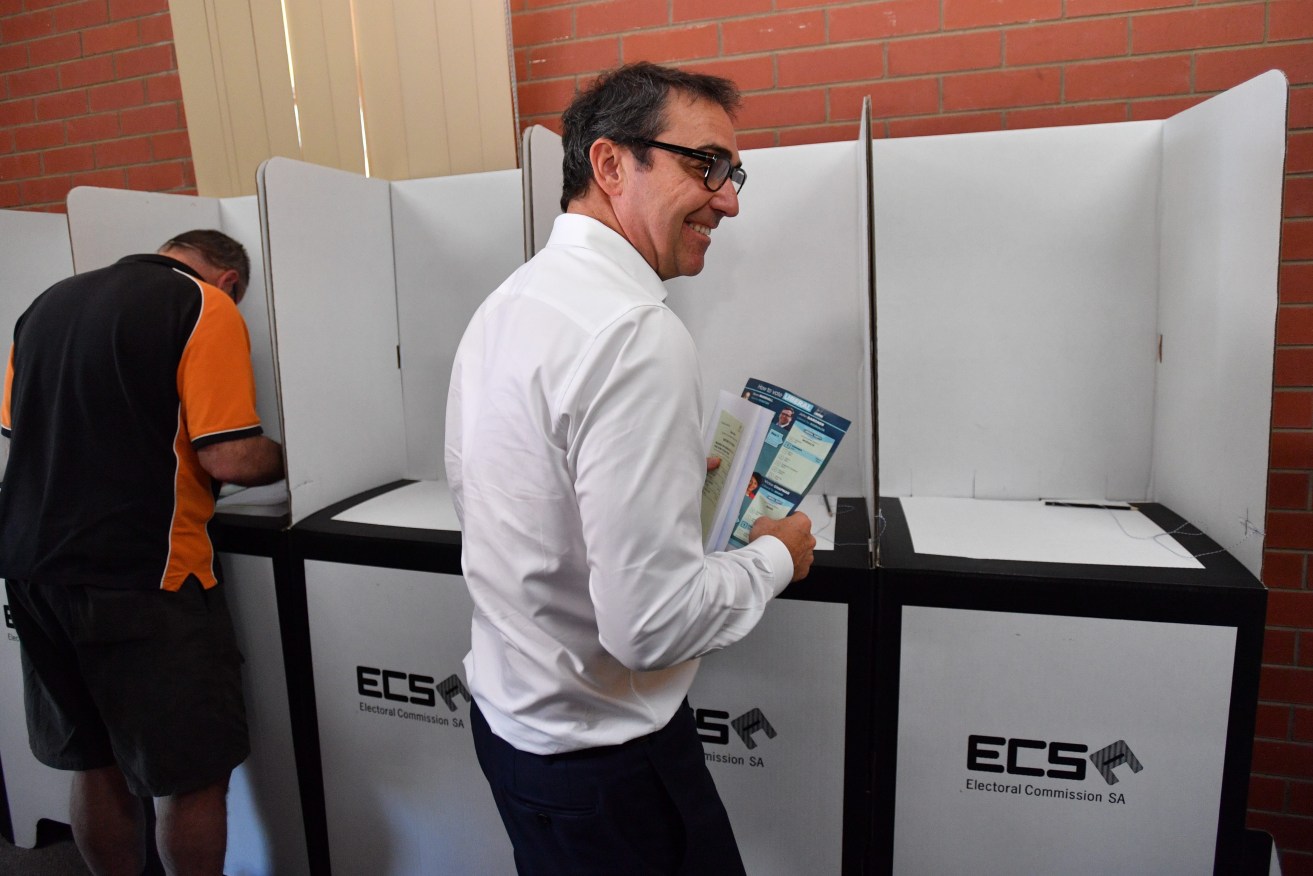Preference voting in Govt’s sights as electoral shake-up looms
EXCLUSIVE | A radical shake-up of South Australia’s electoral system – that would see preferential voting sidelined – is being considered among a raft of changes, with a bill expected to be introduced to parliament within weeks, InDaily understands.

Steven Marshall casting an early ballot for the 2018 state election. Photo: David Mariuz / AAP
Attorney-General Vickie Chapman has been preparing an Electoral Amendment Bill, addressing several changes recommended in the state Electoral Commission’s review of the 2018 state election, at which the Marshall Government was elected.
But it’s understood the Bill will contain a number of further changes, including a push to remove or scale back the proliferation of candidate posters – known as corflutes – that are prominently displayed during campaigns, and a plan to crack down on party activists handing out How To Vote cards and other propaganda at polling stations.
Party sources confirm Chapman has also canvassed support for a bid to introduce ‘Optional Preferential Voting’ [OPV] in the Lower House – a move that would completely overhaul SA’s electoral system.
Currently, MPs are elected based on the distribution of preferences from losing candidates. Under OPV, however, numbering candidates from first to last would be optional, meaning seats could be effectively decided by a ‘first past the post’-style contest, where the candidate with the most primary votes wins the seat outright.
The Government wouldn’t rule out the move today.
Asked by InDaily whether the Attorney-General planned to introduce OPV as part of the planned electoral changes, her office said: “The Government is finalising legislation based on recommendations of the Electoral Commissioner in his 2018 election report, and matters outstanding from 2014 election report. This will be presented to Parliament in due course.”
But it’s understood support within the parliamentary party for OPV was canvassed at a meeting of all MPs in January, with a majority of around two-thirds voting in support, and Chapman undertaking to bring a formalised proposal back to the party-room.
The Labor Opposition had no knowledge of any such proposal today, with leader Peter Malinauskas telling InDaily: “Any move by Steven Marshall to rig the next election would diminish our democracy.”
“We should all be very alarmed at any proposition that would see the polarisation of our democracy in the way we have seen in the United States,” he said.
However, a limited form of OPV for the Upper House was introduced by legislation passed by Labor in its last term, giving voters the option to number only one candidate above the line on their ballot paper or as few as 12 below.
The changes would not need to be ratified by a referendum, but would need to pass the Upper House, where key Greens crossbencher Mark Parnell said while he backed the move for the Legislative Council “we’ve never advocated for it in the Lower House”.
“It would effectively revert to ‘first past the post’, which would basically entrench the two biggest parties and disenfranchise independents and minor parties,” he said.
Independents and minor parties are often elected in the lower house by coming second on primaries but garnering preferences from other candidates on the ticket.
The Electoral Commission’s 2018 election review made no reference to OPV, but the 2014 document noted that around 6 per cent of votes that were declared informal would have been counted if it were in place.
That was down from more than 20 per cent in 2010.
ECSA has also advocated moves to curb delays in counting ballots due to increasing pre-poll votes, including allowing pre-poll votes in an elector’s own district being counted as an ordinary vote and tallied on election night.
It also wants the Act be amended “to allow ECSA to replace long-distance postal voting for electors overseas, in non-metropolitan interstate locations, as well as remote locations of South Australia, with a robust and secure system for the electronic delivery and return of ballot papers”.
Sources expect a Bill to be tabled as early as this month, ahead of the winter recess.
Want to comment?
Send us anemail, making it clear which story you’re commenting on and including your full name (required for publication) and phone number (only for verification purposes). Please put “Reader views” in the subject.
We’ll publish the best comments in a regular “Reader Views” post. Your comments can be brief, or we can accept up to 350 words, or thereabouts.




